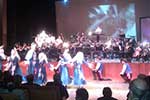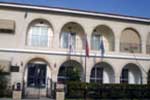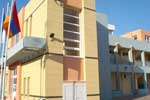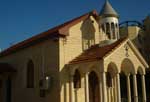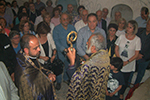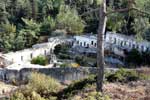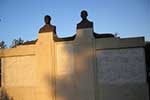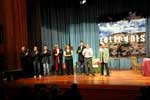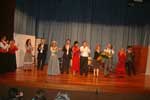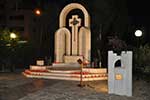Sassounian Column

ARMENIAN GENOCIDE ISSUE SHOULD NOT BECOME A POLITICAL FOOTBALL
Much ink has been spilled since June 23, when Pres. Serzh Sargsyan spoke in Moscow about Armenian-Turkish relations. Given the fact that his statement was published in distorted form in various publications due to inaccurate or partial translation, I would like to present my own English rendition of Mr. Sargsyan's statement which was released by the President's press office in the Armenian language: "The second issue that I wanted to talk about is Armenian-Turkish relations. Our position on this issue is clear. There should not be closed borders between neighboring states in the 21st century. Regional cooperation could be the best way of establishing stability. The Turkish side is suggesting the formation of a commission to study the historical evidence. We are not against the creation of such a commission, but only when the border is opened between our countries. Otherwise, the commission could become the means of abusing and prolonging this issue for years. In the near future, I intend to undertake new steps to boost Armenian-Turkish relations. Most probably, I will invite Turkish President Abdullah Gul to Yerevan to watch together the soccer match between the national teams of Armenia and Turkey."
There was an immediate burst of criticism to Pres. Sargsyan's statement, both within and outside Armenia.
His conditional acceptance of the Turkish suggestion to form a joint commission to study the Armenian Genocide was viewed by his domestic political opponents as questioning the facts of the Genocide.
The Armenian Revolutionary Federation (ARF), a junior partner in the coalition government, also expressed serious concern. The ARF Bureau, the party's supreme body, issued the following statement: "The fact of the Armenian Genocide is not a subject of discussion, and no high ranking official representing Armenia may have a different approach." The Armenian Democratic League and the Social Democrat Hunchakian Party likewise criticized the President's announcement. However, Pres. Sargsyan's statement was enthusiastically received by U.S. Deputy Assistant Secretary of State Matt Bryza, his wife, Zeyno Baran, a Turkish-American working at the Hudson Institute, the Turkish media, and the spokesman for the Foreign Ministry of Turkey.
To soften the mounting criticism of Pres. Sargsyan's statement by various Armenian circles, his Press Secretary, Samvel Farmanyan, issued a clarification:
"We are not against any study of even obvious facts and widely accepted realities. Agreeing to a study does not mean casting doubt on the veracity of facts. However, the creation of such a commission would be logical only after the establishment of diplomatic relations and the opening of the border between our countries. Otherwise, it could become a tool for dragging out and exploiting the existing problems." In a jab at the main opposition alliance, the Popular Movement led by former Pres. Levon Ter-Petrossian, Farmanyan stated: "It is strange that the genocide issue is being exploited by individuals who did everything in the past to condemn to oblivion that tragic page of our history. The approach of getting partisan political dividends from this issue is unacceptable."
Armenia's Foreign Minister Eduard Nalbandyan also issued a statement reconfirming that Armenia will continue to seek international recognition of the Armenian Genocide, despite its readiness to accept the formation of an Armenian-Turkish commission. "The genocide issue remains on our agenda," the Armenian Foreign Minister said. The ARF subsequently announced that it has received "the necessary explanation and clarification" from Pres. Sargsyan that the would-be commission should n
ot determine whether or not a genocide occurred, but simply research various details of the Armenian Genocide.
Most Armenians are concerned that Pres. Sargsyan is reacting positively to a proposal by Turkish Prime Minister Recep Tayyip Erdogan in 2005 to form a commission of Armenian and Turkish historians to study the facts of the Armenian Genocide. At that time, Pres. Robert Kocharian responded to Erdogan's proposal by suggesting that all outstanding issues between Yerevan and Ankara be reviewed by an inter-governmental commission. He also urged Turkey to establish normal diplomatic relations with Armenia, including the reopening of the border.
Just when tempers on the sensitive issue of Genocide study seemed to be cooling off, an op-ed column bearing Pres. Sargsyan's signature was published in the July 9 issue of the Wall Street Journal Europe, titled: "We are ready to talk to Turkey. The Wall Street Journal, the mouthpiece of neo-cons in the Bush Administration, has never been a supporter of Armenia, and anything it publishes is suspect of being contrary to Armenian interests! Pres. Sargsyan's column, starting with its headline, was defensive and appeared overly accommodating to Turkey. It raised once again the issue of the joint commission "to comprehensively discuss all of the complex issues affecting Armenia and Turkey," However, it clearly stated that the acceptance of such a commission is predicated on the establishment of "normal political relations," including the opening of the border, which would enable discussion of "even the most contentious historical issues." Interestingly, this was Mr. Sargsyan's second op-ed column in the Wall Street Journal in the last two years. As Defense Minister, he wrote a commentary in the Journal's December 22, 2006 issue, titled: "In Spite of Genocide...."
In his most r
ecent article, Pres. Sargsyan extended an invitation to Pres. Gul to come to Yerevan on September 6 "to enjoy" together the first-ever match between the national soccer teams of Armenia and Turkey. Pres. Sargsyan described the upcoming match as "a new symbolic start in our relations." Inviting the President of Turkey for an unprecedented visit to Armenia opened the door for a new round of controversy, at home and abroad. Two prominent ARF leaders announced last week that their party, despite being part of the governing coalition, would organize "a protest if Gul arrives in Yerevan in September."
The most unexpected condemnation of Pres. Sargsyan for
inviting the Turkish President to Yerevan came from former President Kocharian who shocked everyone by publicly criticizing for the first time his own protg and successor. Pres. Kocharian said that if he were in charge now, "Turkey's president would definitely not be invited to watch football in Yerevan."
Despite Pres. Sargsyan's several pronouncements inviting Pres. Gul to Yerevan to watch the Sept. 6 soccer match, the Turkish President has not yet responded, except for saying that he is "evaluating the invitation." Nevertheless, U.S. Deputy Assistant Secretary of State Matt Bryza has urged Mr. Gul to go to Yerevan, describing the invitation as an opportunity to achieve "unbelievable progress" in Armenian-Turkish relations.
Those who wonder why a joint study of the Armenian Genocide generates such controversy among Armenians, the answer is that the Genocide is a historical fact recognized by more than 20 countries, the European Parliament, a United Nations human rights panel, scores of Genocide and Holocaust scholars, Nobel Prize winners, and others. The establishment of such a commission is viewed by Armenians as a ploy by Turkey to prolong the denial of the Genocide and discourage others from recognizing it, while the commission members are engaged in endless debates and discussions. The mere agreement by Armenia to form such a commission raises questions about the facts of the Genocide, sends the false signal that Armenians themselves are not sure if a genocide actually occurred, and undermines the credibility of all those who have officially recognized it before such a study.
Finally, how would Turkish historians be able to express their honest opinions on the Armenian Genocide, knowing full well that the mere mention of the Genocide is a crime under Turkish law?
Given all the complexities and sensitivities of the Genocide issue, why would Pres. Sargsyan agree to form such a joint commission? The short answer is that ever since the February 19 presidential election and the subsequent unrest, Pres. Sargsyan has been subjected to pressure by Western countries to make concessions in key foreign and domestic issues, such as the Artsakh (Karabagh) conflict, relations with Turkey, freedom of expression, corruption, and the release of prisoners jailed after the March 1 clashes. Pres. Sargsyan may have possibly thought that by responding positively to some of these Western "suggestions," he would succeed in gaining
the backing of the United States and Europe to counter his domestic opposition.
The problem is that due to his government's relative inexperience, particularly in the area of foreign policy, Pres. Sargsyan's statements have antagonized his supporters at home and abroad, thereby increasing the ranks of his opponents, instead of reducing them.
My prediction is that the planned joint commission will fail to materialize due to the virtual certainty that Turkey would reject Pres. Sargsyan's pre-condition of opening the bor
der. Furthermore, Turkey has set its own conditions for opening the border with Armenia -- the withdrawal of Armenian forces from Artsakh, recognizing the territorial integrity of Turkey, and ending Armenia's efforts for Genocide recognition. Even if the two sides manage to overcome these major hurdles, there would be endless disputes on the formation of the joint commission, the selection of participants, scope of study, timeline, budget, access to archives, and even the shape of the table to sit around. Of course, whichever side is better at spinning these disputes would win the public relations war and blame the other side for the commission's failure.
Regarding the invitation to Pres. Gul to come to Yerevan for the soccer match on Sept. 6, there is a good chance that Turkey may send a lower ranking official instead, in view of the fact that Turkish leaders are facing serious troubles on the home front.
Armenia is not a priority for them at this moment.
With the arrest of several former generals accused of plotting to overthrow Erdogan's government, and the possibility of Turkey's Constitutional Court to ban the ruling party and its leadership from holding public office, no one can predict whether Pres. Gul would be watching a soccer match in Yerevan or the four walls of his prison cell in Ankara!
Nevertheless, should Pres. Gul or another Turkish leader show up in Yerevan on Sept. 6, Armenian officials should follow standard protocol for visiting dignitaries and take the Turkish visitor to the Armenian Genocide Monument to lay a wreath in memory of the 1.5 million Armenian victims. When former Pres. Levon Ter-Petrossian went to Ankara on April 21, 1993, he visited the Ataturk Mausoleum, as protocol required.
It is unfortunate that the highly emotional and sensitive issue of the Armenian Genocide has been exploited as a political football by all sides. No one has the right to strike a political bargain over the terms and conditions of recognizing such a heinous crime. The core issue of the Armenian Genocide should not be an object of manipulation by Turks or Armenians or anyone else!
By Harut Sassounian
Publisher, The California Courier




